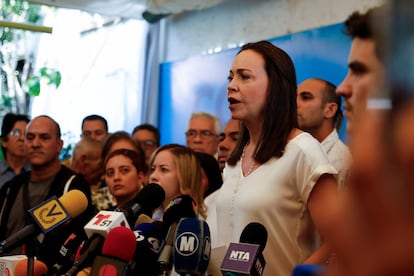Unequal competition in Venezuela
The Maduro government obstructs the registration of opposition candidates and casts a shadow on the legitimacy of the elections

The registration of presidential candidates in Venezuela on Monday anticipated the opaque climate of an electoral process that risks repeating the pattern of previous ones and ending in an unequal competition on July 28. Chavismo demonstrated that it maintains absolute control over the institutions and the rules of the game. After the disqualification of María Corina Machado, who was President Nicolás Maduro’s best-positioned rival, the opposition was not even able to register the candidate named as her substitute, the academic Corina Yoris. The reason was an apparent failure of the online registration form of the National Electoral Council (CNE), which rejected her application without further explanation. However, an extension of the deadline allowed the registration of a low-profile candidate accepted by the Unitary Platform, the alliance that closed ranks with Machado.
Criticism of the registration procedure has been practically unanimous. The White House, the European Union, but also progressive Latin American governments such as the Colombian administration of Gustavo Petro and the Brazilian administration of Luiz Inácio Lula da Silva, expressed concern about the lack of guarantees. Maduro rejected the accusations and called them “interferences,” although in the end the Chavista authorities admitted the candidacy of the Democratic Unity Roundtable (MUD), predecessor of the Unitary Platform. Its candidate is the diplomat Edmundo González Urrutia, a provisional figure whose chief task will be to save the spot for a more relevant candidate. The law allows a candidate to be replaced up to 10 days before the vote.
González Urrutia is joined, among the candidates who managed to register, by two other veteran anti-Chavista politicians: Enrique Márquez, a social democratic leader who commands a certain consensus in the coalition led by Machado, and the governor of the state of Zulia, Manuel Rosales, who is currently the main opposition public official. Nine other applicants also signed up, including figures close to the government and opponents from minority parties.
Maduro, whom all polls place behind Machado, is trying to eliminate from the race any rivals with a possibility of tarnishing his victory. On this occasion, compared to the 2018 election, the premises seemed different. Hugo Chávez’s successor had negotiated on both sides, with the United States and with the opposition. In 2023, Washington relaxed some sanctions on oil and even agreed to return Alex Saab, prosecuted in Florida as an alleged frontman for Maduro. The president’s number two aide, Jorge Rodríguez, head of the National Assembly, staged an agreement with the anti-Chavista forces in Barbados. But it all came to nothing.
In January, there was a twist in the script. The government denounced five alleged plans to assassinate the president, and there were dozens of arrests. Maduro has precedents that support the theory of assassination, such as the crazy landing of mercenaries and former soldiers on two beaches near Caracas in the midst of the Covid-19 pandemic. But that fear has prevailed and has led Chavismo to entrench itself again.
There are almost four months left until the elections, and basic aspects such as the presence of independent observers still remain to be defined. What the registration of candidates has sketched out is an arduous battle for basic electoral rights. It is a worrying precedent that could make the July elections lose legitimacy.
Sign up for our weekly newsletter to get more English-language news coverage from EL PAÍS USA Edition
Tu suscripción se está usando en otro dispositivo
¿Quieres añadir otro usuario a tu suscripción?
Si continúas leyendo en este dispositivo, no se podrá leer en el otro.
FlechaTu suscripción se está usando en otro dispositivo y solo puedes acceder a EL PAÍS desde un dispositivo a la vez.
Si quieres compartir tu cuenta, cambia tu suscripción a la modalidad Premium, así podrás añadir otro usuario. Cada uno accederá con su propia cuenta de email, lo que os permitirá personalizar vuestra experiencia en EL PAÍS.
¿Tienes una suscripción de empresa? Accede aquí para contratar más cuentas.
En el caso de no saber quién está usando tu cuenta, te recomendamos cambiar tu contraseña aquí.
Si decides continuar compartiendo tu cuenta, este mensaje se mostrará en tu dispositivo y en el de la otra persona que está usando tu cuenta de forma indefinida, afectando a tu experiencia de lectura. Puedes consultar aquí los términos y condiciones de la suscripción digital.









































